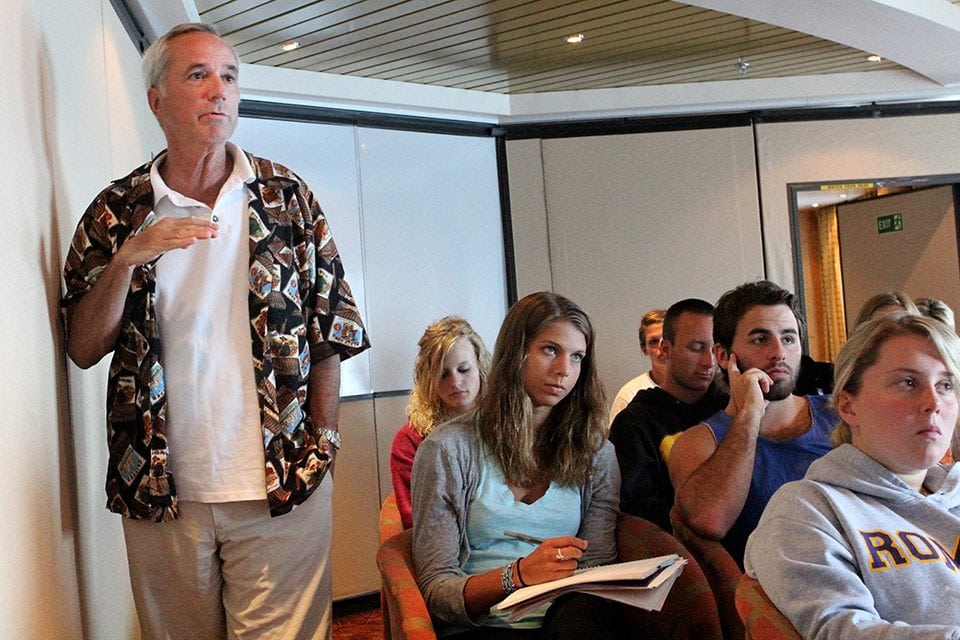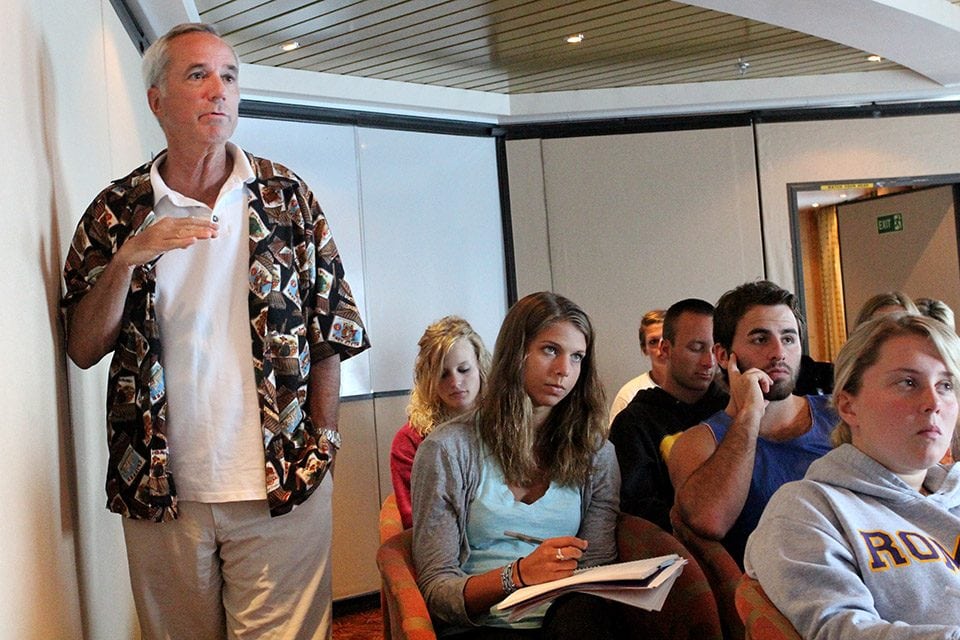
Dr. Robert Powers is a Professor of Medicine and Emergency Medicine at the University of Virginia. On the Summer 2012 voyage he is teaching comparative health systems; the class looks at how healthcare is financed and delivered in the US and compares it with models and systems in place in Europe and around the Mediterranean. Dr. Powers takes his students to three different medical facilities in Lisbon in order to facilitate their understanding of the strength and weaknesses of the socialist approach to health care, especially as it compares with the capitalist approach.
If you enjoy theoretical debate, you would love Dr. Powers’ class. He challenges his students to think about US health care as it’s currently structured: what does it really mean when medicine is treated as a commodity, how is Medicare different from the private insurance system most Americans deal with, and what exactly is socialized medicine?
Dr. Powers meets up with fellow Public Health expert Dr. Rui Portugal (appropriately named), who starts the students’ tour of Lisbon’s public medical facilities at the 1,000 bed Santa Maria University Hospital, one of the country’s largest. The 1960’s era building has renovated space inside, and includes public posting of waiting times for appointments to see certain specialists. Dr. Portugal talks about their system of care, and the problems they face. As Dr. Powers famously says, and Dr. Portugal repeats, it’s all about the money. The money issues are framed differently in a socialized system, but are still a major challenge.

Health coverage is extended to all individuals who reside in Portugal, either legally or illegally, through a low cost and effective system. Care is provided free or at extremely low cost in facilities that are owned and operated by the government. The system is highly regarded and typically ranked higher than the US system.
To sustain this level of care, tax revenues are needed. In the current economic downturn Portugal is, like most health providers in the US, looking for efficiencies. Portugal ranks in the top five European countries when you look at their medical expenses as a percent of GDP, but when you look at expenses on a per capita basis, they are in the bottom three.
The next stop on the tour is what we might call a “medical home.” This is a type of publicly owned clinic that exists in every neighborhood. It is where families go to take care of most of their medical needs, staffed by government employed doctors, nurses and other support staff. When appropriate, patients are referred from here to hospitals and more sophisticated care. The students meet with a primary care physician and tour the spare, but modern facility, noting the computerized medical records, patient’s ability to self-schedule, comfortable exam and treatment rooms, and posted prices for various low-cost services.

The tour ends just north of the city at a sparkling new facility built as part of a public/private partnership. Beatrix Angelo hospital was opened in January 2012 and is as modern and luxurious as any new private hospital in the States; however, it’s public and open to all Portuguese residents. It’s owned by the state and run by a for-profit company. This model applies private business principles to the perceived inefficiencies that accompany government ownership and operation of a large enterprise.
Back in class students have a discussion with Dr. Powers about what they saw and learned on their tour. Ultimately they conclude that while there are not as many frills associated with most of the facilities, the actual care seems to be at least as good as what they are used to in the US. Many say they now think the rhetoric they hear at home about socialized medicine is just that; rhetoric. Care in Portugal is efficient and effective; it is not antiquated and outdated, and patients are not waiting in long lines at dirty hospitals for untrained or incompetent doctors to work on them.
Students were able to have an honest discussion about the pros and cons of a socialized system from both a practical and policy standpoint, and then compare them to similar challenges within the private system. Dr. Powers wants his students to be equipped to make evidence-based judgments, whether they move on as healthcare providers, consumers or taxpayers. After his course and the field lab, many of them are.



